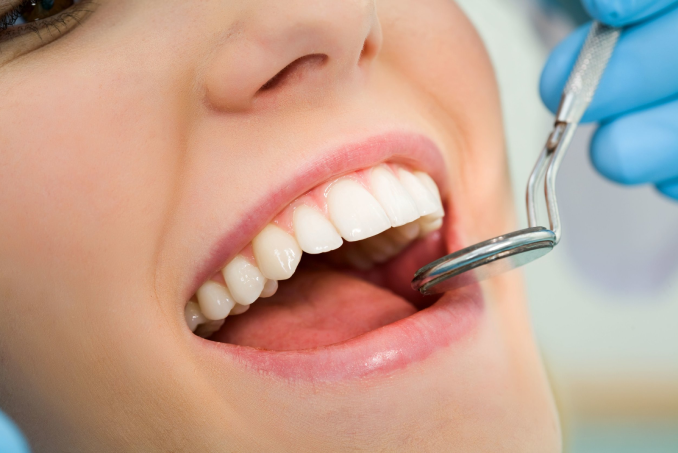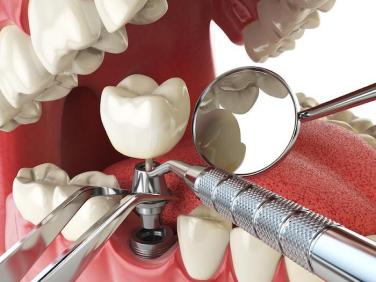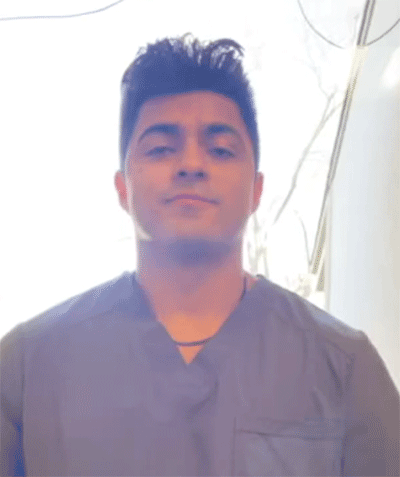UTAH DENTAL IMPLANTS
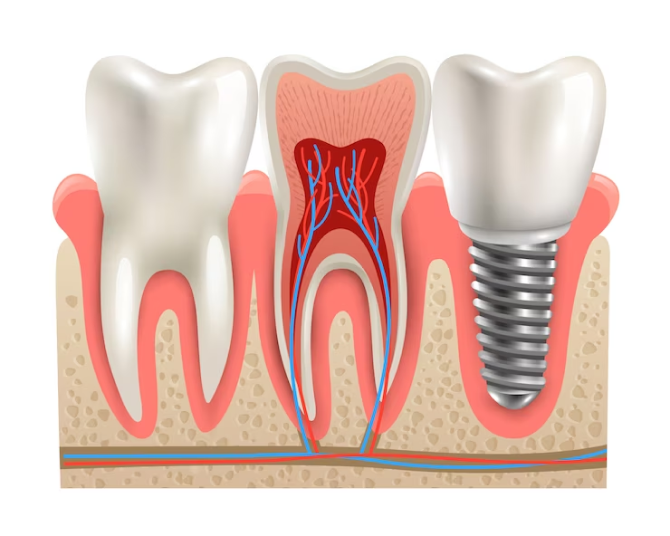
What are Dental Implants?
Dental implants are a revolutionary solution in the field of dentistry, designed to replace missing teeth and restore oral function and aesthetics. Unlike traditional dentures or bridges, dental implants are a permanent and long-lasting option, mimicking the natural structure and appearance of real teeth. Our doctors are experienced with dental implants in South Jordan and Salt Lake City. We can make yours look fantastic.
A dental implant is a small, biocompatible titanium post that is surgically inserted into the jawbone beneath the gumline where it acts as a sturdy and durable artificial tooth root. Over time, the implant fuses with the surrounding bone in a process known as osseointegration, which provides exceptional stability and support for the artificial tooth or crown that will be attached to it.
Dental implants offer numerous advantages over other tooth replacement options. Unlike dentures, they do not require messy adhesives and can be cared for just like natural teeth through regular brushing, flossing, and routine dental check-ups. They also prevent bone loss, which can occur when a tooth is missing, and provide better stability for chewing and speaking, restoring overall oral function and comfort.
Moreover, dental implants offer a significant boost to a patient’s self-confidence, as they allow individuals to regain their smile’s full beauty and functionality. Whether a single tooth needs replacement or an entire arch, dental implants in Utah are a highly effective, long-lasting, and aesthetically pleasing solution for patients seeking to restore their smile and oral health. If you need dental implants in South Jordan, click the button below or call us to request an appointment.
Dental Implants in South Jordan
At Utah Periodontal Specialists, we are committed to providing the highest level of care and cutting-edge techniques to our patients. We understand the importance of convenience, which is why we offer a South Jordan location to serve our patients better.
Our team of skilled and experienced doctors is dedicated to addressing all aspects of periodontal health and delivering exceptional treatment outcomes. Whether you require dental implants, gum disease treatment, gum grafting, or any other periodontal procedures, our specialists are here to cater to your unique needs.
At our South Jordan location, you can expect a warm and welcoming environment, where your comfort and well-being are our top priorities. Our state-of-the-art facility is equipped with the latest technology and tools, allowing us to provide efficient and effective treatments with minimal discomfort.
Utah Dental Implants Cost
The cost of dental implants in Utah can vary depending on several factors, including the number of implants needed, the complexity of the case, and the type of implant you choose. On average, a single dental implant in Utah may cost anywhere from $3,000 to $5,000 or more. However, in our office, you can expect to pay approximately $2,000 per implant without insurance. The costs will likely be much lower if you have dental insurance. Keep in mind that this is just an estimated range, and it’s essential to consult with our staff to get a more accurate quote based on your individual needs and circumstances. Dental implant costs may also include additional expenses for procedures like implant placement surgery, abutment placement, and the final dental crown or prosthetic. Additionally, dental insurance coverage, if applicable, can significantly impact the overall out-of-pocket expenses for dental implants.
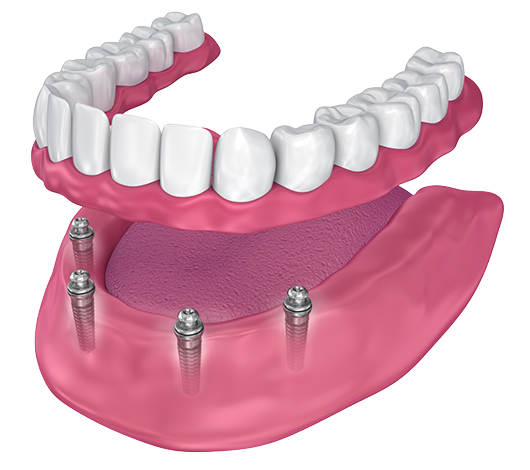
Different Types of Dental Implants
Dental implants come in various types, each designed to cater to specific dental needs and conditions. Here are some of the most common types of dental implants:
- Endosteal Implants: Endosteal implants are the most widely used type of dental implants. They are placed directly into the jawbone through a surgical procedure. These implants are typically made of titanium and have a screw-like shape. Endosteal implants are suitable for patients with sufficient bone density and are commonly used for single tooth replacement, multiple teeth replacement, or to support dental bridges and dentures.
- Subperiosteal Implants: Subperiosteal implants are an alternative to endosteal implants, especially for patients who have inadequate bone height or volume for traditional implants. Instead of being placed inside the jawbone, subperiosteal implants sit on or above the jawbone but beneath the gum tissue. A metal framework is used to support the prosthetic teeth, providing a stable foundation for the replacement teeth.
- All-on-4 and All-on-6 Implants: All-on-4 and All-on-6 implants are designed to replace an entire arch of missing teeth (upper or lower) with just four or six strategically placed implants, respectively. These implants are usually tilted to maximize contact with the available bone, allowing for immediate loading and the attachment of a fixed dental bridge or denture on the same day of the implant surgery. This approach is beneficial for patients who require extensive teeth replacement or have experienced significant bone loss.
- Mini Dental Implants (MDIs): Mini dental implants are smaller in diameter compared to standard implants. They are suitable for patients with limited bone density or those who prefer a less invasive procedure. Mini implants are often used to stabilize dentures and can be placed with less complex surgery and a quicker healing period.
- Zygomatic Implants: Zygomatic implants are specialized implants used when patients have severe bone loss in the upper jaw, making traditional implant placement challenging. Instead of being placed in the jawbone, zygomatic implants anchor into the cheekbone (zygomatic bone) to provide a stable foundation for the prosthetic teeth
I love coming here! I know that’s a totally funny thing to say about a place where you get work done on your teeth. In all honesty though, everyone here is so friendly and professional. They make you feel welcome and comfortable. I’ve never had a bad experience and I’ve been coming here for years. I’ve seen the same hygienist and she’s always so kind and helpful. She offers advice on how I can clean my teeth better. You can tell she not only cares about her job but about the clients she sees as well!
How to Decide Which Implant to Get
Choosing the right kind of dental implant involves considering various factors unique to each individual. A comprehensive consultation with a qualified dentist or oral surgeon is very important to assess your oral health, jawbone density, and treatment goals. Your overall health, medical history, and potential allergies or sensitivities to certain materials also play a role. Additionally, aesthetic preferences and the complexity of the treatment may impact the choice of implant.
How to Know if You’re a Good Candidate for Dental Implants
Determining if you’re a good candidate for a dental implant in Utah involves some key considerations:
- Sufficient Bone Density: Dental implants require an adequate amount of healthy jawbone to provide a stable foundation. A bone density assessment will be conducted through X-rays to ensure that your jawbone can support the implant.
- Good Oral Health: Candidates for dental implants should have overall good oral health, with healthy gums and no active gum disease or infections. If any oral health issues are present, they will need to be addressed before proceeding with the implant procedure.
- No Uncontrolled Medical Conditions: Certain medical conditions, such as uncontrolled diabetes or autoimmune disorders, may affect the success of dental implants.
- Non-Smoker or Willing to Quit: Smoking can hinder the healing process and increase the risk of implant failure. Ideally, candidates should be non-smokers or willing to quit before and after the implant procedure.
- Age Consideration: While age itself is not a determining factor, candidates should have finished growing, typically around late adolescence or early adulthood, before getting dental implants.
The Dental Implant Process:
Before: The dental implant process begins with a consultation with one of our qualified dentists or oral surgeons. During this stage, your oral health will be evaluated, and X-rays may be taken to assess your jawbone’s condition and determine if you are a suitable candidate for the procedure. Your dentist will discuss the treatment plan, address any concerns you may have, and provide you with information about the expected outcomes.
During: The actual dental implant procedure typically involves several stages. First, the titanium implant post is surgically placed into the jawbone beneath the gumline. Afterward, a healing period is necessary, during which osseointegration occurs, allowing the implant to fuse with the surrounding bone. The healing period may take a few months. Once the implant has integrated, an abutment is attached to the implant, serving as a connector between the post and the prosthetic tooth. Finally, a custom-made dental crown, bridge, or denture is affixed to the abutment, completing the restoration.
After: After the dental implant procedure, it’s important to follow your dentist’s post-operative care instructions diligently. This includes taking any prescribed medications, maintaining proper oral hygiene, and attending follow-up appointments as scheduled. The healing process should be closely monitored to ensure the implant successfully integrates with the jawbone.
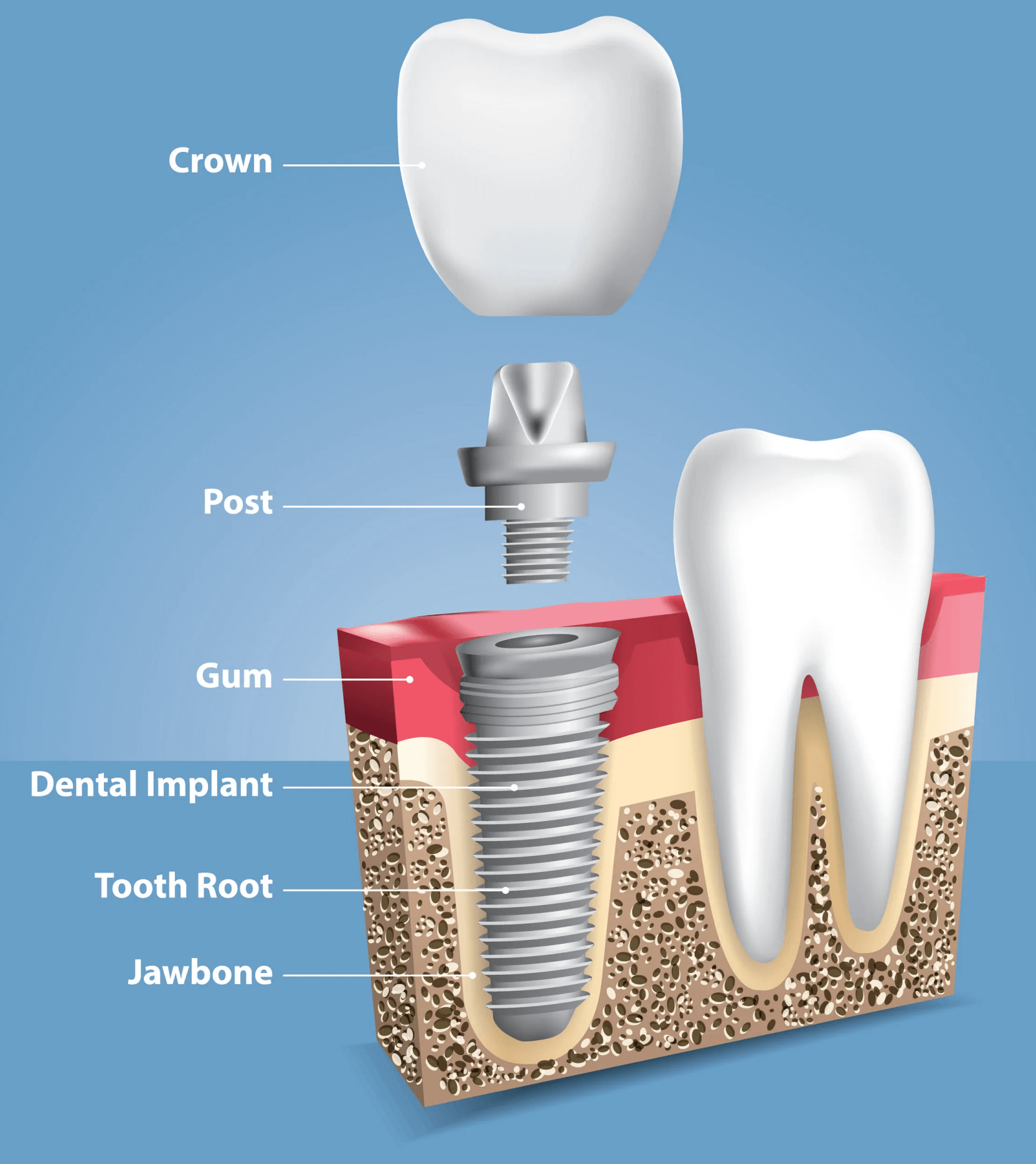
Utah Dental Implants Types of Materials
When it comes to dental implants, several materials are commonly used to create the implant post and the prosthetic tooth or crown. The two main types of materials used for dental implants are titanium and zirconia.
- Titanium Dental Implants: Titanium is the most widely used material for dental implant posts. This is due to its biocompatibility, which means it is well-tolerated by the human body and does not trigger adverse reactions or cause allergies. Titanium implants have a high success rate and can integrate well with the jawbone through osseointegration, providing a stable and long-lasting foundation for the prosthetic tooth.
- Zirconia Dental Implants: Zirconia dental implants have gained popularity as an alternative to titanium implants. Zirconia is a ceramic material known for its strength and natural tooth-colored appearance, making it an attractive choice for patients who prefer metal-free dental restorations. Zirconia implants are especially suitable for individuals with metal allergies or sensitivities. However, it’s essential to note that zirconia implants may not have the same level of osseointegration as titanium implants, and they may require more careful consideration when selecting the appropriate case.
Why Choose Us for Your Utah Dental Implants?
Choosing us for your Utah dental implants means selecting a team of highly qualified and experienced dental professionals who are committed to providing exceptional care and outstanding results. Our skilled dentists and oral surgeons are well-versed in the latest dental implant techniques and technologies, ensuring that you receive the most advanced and effective treatment available. We take the time to thoroughly assess your oral health, using state-of-the-art imaging and diagnostic tools, to determine the most suitable implant options for your specific case. With our warm and welcoming environment, you can feel at ease throughout your dental implant journey. Our South Jordan office is conveniently located close to Kearns, West Jordan, Draper, West Valley, Taylorsville, Herriman, Bountiful, Murray, and Sandy for your convenience.
